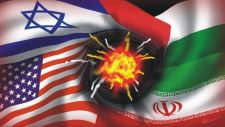As Syria transitions, its shifting geopolitical landscape carries significant implications for sectarian tensions, militant resurgence, and global influence.
THE FALL OF the Assad regime has sparked antagonisms among its former allies, including Iran, Turkey, and Russia. Meanwhile, the leverage gained by Israel, ostensibly backed by American support, bodes ill for the region.
The dramatic developments in Syria over the past 13 days, culminating in the regime’s rapid collapse, have transfixed the world. Thousands of Syrians, after years in exile, are now attempting to return home. It seems the removal of a murderous dictator could address the refugee crisis that displaced millions to neighboring countries and Europe. However, paradoxically, in recent months, more nations had been normalizing ties with Assad, with Italy even reinstating its ambassador to Damascus.
The evolving Syrian situation and the diminishing influence of Iran in the region could have profound implications for the Middle East’s geopolitical landscape, power dynamics, and strategic alignments. Regional actors, including Iran, Turkey, and the Persian Gulf states, are now vying to establish footholds during Syria’s transitional period, realigning efforts to safeguard their interests. Saudi Arabia and the UAE, through calculated engagement with Syrian political factions and reconstruction initiatives, may seek to counter Turkish and Iranian aspirations.
 Additionally, Syria’s turmoil could exacerbate sectarian tensions. Sunni Arab states may attempt to block Iran’s resurgence, while militant groups such as ISIS could exploit the chaos to rebuild their operational bases.
Additionally, Syria’s turmoil could exacerbate sectarian tensions. Sunni Arab states may attempt to block Iran’s resurgence, while militant groups such as ISIS could exploit the chaos to rebuild their operational bases.
The Syrian conflict has become the Achilles’ heel of Iran’s regional ambitions. The Assad regime, a longstanding ally of Iran since the Islamic Republic’s founding in 1979, called on Tehran for assistance to suppress the uprising.
Hezbollah, an Iranian proxy, deployed thousands of fighters in Syria, evolving from a Lebanese political and militant group into an Iranian expeditionary force. However, Hezbollah’s decade-long involvement exposed it to Israeli surveillance, which aided Israel’s recent military campaign that decimated the group’s leadership and capabilities.
Iran’s overreach in Syria strained its resources and exposed its vulnerabilities, even as it added another Arab capital to its sphere of influence. Conversely, Israel may adopt a more aggressive stance against Iran-backed groups in Syria to curb Tehran’s influence in its northern border regions.
Syria’s challenges are far from over, including uncertainty about the rebel group Hayat Tahrir al-Sham’s (HTS) vision for governance, fears of violent reprisals after decades of oppression, and the danger of ISIS resurgence. Syrians urgently seek an end to foreign meddling, but no regional power is likely to exercise restraint.

The sudden collapse of Bashar al-Assad’s regime has reshaped the Middle East’s geopolitical landscape overnight. Iran and Turkey, which previously maintained a delicate balance, now find themselves at odds over competing interests in post-Assad Syria.
Iran’s Supreme Leader, Ali Khamenei, has accused the United States, Israel, and Turkey of orchestrating Assad’s ouster as part of a “Zionist-American” plot. Despite years of cooperation—such as Turkey’s economic support to circumvent international sanctions on Iran—relations between Tehran and Ankara are fraying.
Turkey, which has long supported anti-Assad rebel groups, including HTS, primarily seeks to create a buffer zone and suppress Kurdish groups in northern Syria. Turkey’s priority in a post-Assad scenario is preventing Kurdish factions from gaining autonomy in the new Syrian government. Henri J. Barkey, a senior fellow at the Council on Foreign Relations, argues that Turkey’s primary objective is to neutralize the Syrian Democratic Forces (SDF), fearing they may secure an autonomous status akin to Iraqi Kurds.
 For Iran, Assad was a strategic ally, and Turkey’s growing influence in Syria poses a significant challenge to Tehran’s regional ambitions. Ahmad Vakhshiteh, a senior lecturer at RUDN University in Moscow, suggests that recent developments have tipped the balance of power in Turkey’s favor, with Ankara poised to exploit Tehran’s vulnerabilities for broader geopolitical gains.
For Iran, Assad was a strategic ally, and Turkey’s growing influence in Syria poses a significant challenge to Tehran’s regional ambitions. Ahmad Vakhshiteh, a senior lecturer at RUDN University in Moscow, suggests that recent developments have tipped the balance of power in Turkey’s favor, with Ankara poised to exploit Tehran’s vulnerabilities for broader geopolitical gains.
One contentious issue is Turkey’s support for a land corridor connecting the Azerbaijani exclave of Nakhchivan to Azerbaijan, bypassing Armenia. While Turkey views this corridor as a link to Turkic regions, Iran fears it could block its access to Armenia.
Despite escalating tensions, Turkey has remained a critical economic partner for Iran, facilitating trade and providing essential goods. Official Iranian customs data reveals that trade between the two countries reached $10 billion in the first ten months of this year, with aspirations to triple this figure within five years. However, the growing discord could threaten this economic relationship.
Against this backdrop, the Western alliance, led by the United States and Europe, may eventually intensify its strategic involvement in Syria. Coordinated diplomatic efforts and interventions would serve to curb the resurgence of militant groups and limit Iranian and Russian influence in the Mediterranean.
Syria’s path forward is fraught with uncertainty. While Assad’s ability to halt Israeli advances into the buffer zone once united diverse regional powers, his removal could embolden Israel to pursue broader objectives. The coming days may reveal Israel’s ultimate ambitions for the region. ![]()
Also Read: Strained Ties in the Neighbourhood: The Challenges of India’s Foreign Policy
Disclaimer : PunjabTodayNews.com and other platforms of the Punjab Today group strive to include views and opinions from across the entire spectrum, but by no means do we agree with everything we publish. Our efforts and editorial choices consistently underscore our authors’ right to the freedom of speech. However, it should be clear to all readers that individual authors are responsible for the information, ideas or opinions in their articles, and very often, these do not reflect the views of PunjabTodayNews.com or other platforms of the group. Punjab Today does not assume any responsibility or liability for the views of authors whose work appears here.
Punjab Today believes in serious, engaging, narrative journalism at a time when mainstream media houses seem to have given up on long-form writing and news television has blurred or altogether erased the lines between news and slapstick entertainment. We at Punjab Today believe that readers such as yourself appreciate cerebral journalism, and would like you to hold us against the best international industry standards. Brickbats are welcome even more than bouquets, though an occasional pat on the back is always encouraging. Good journalism can be a lifeline in these uncertain times worldwide. You can support us in myriad ways. To begin with, by spreading word about us and forwarding this reportage. Stay engaged.
— Team PT

